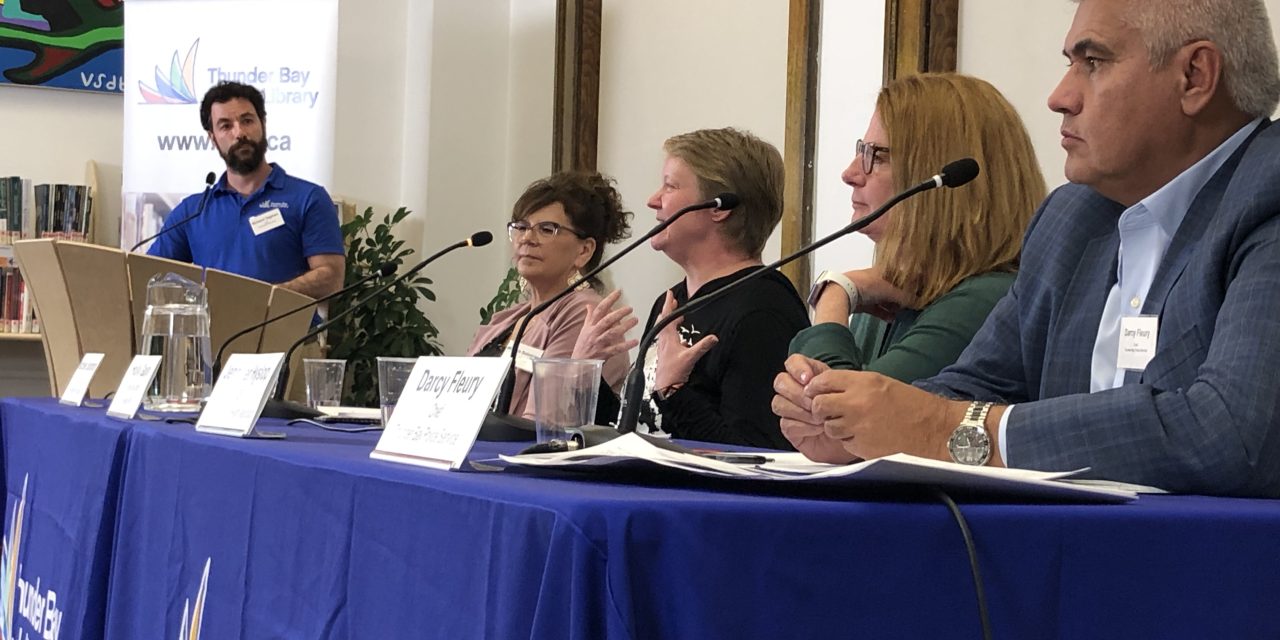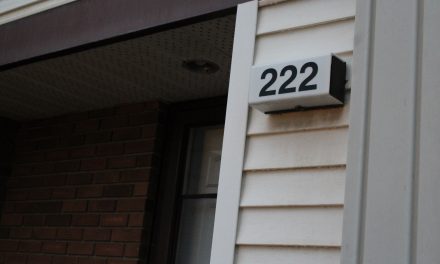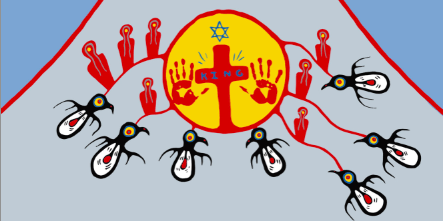Local Leaders Discuss Community Safety, Mayor Absent
Story and photo by Matt Prokopchuk
Dismantling systemically racist policies in all institutions, allocating more resources for mental health, addictions, and other social services, and ensuring much greater access to affordable housing were some of the core themes four community leaders identified as key issues during a public forum and moderated panel discussion on community safety at the Brodie Resource Library Tuesday evening.
The panel was comprised of Fort William First Nation Chief Michele Solomon, Thunder Bay Police Chief Darcy Fleury, the CEO of the Canadian Mental Health Association’s Thunder Bay branch Jennifer Hyslop, and Holly Gauvin, the executive director of Elevate NWO, a leading support organization for people with HIV/AIDS and hepatitis C—the organization also does a great deal of work around harm reduction and other social supports. Thunder Bay Mayor Ken Boshcoff was also originally confirmed to be taking part, according to the library’s public information about the event; library CEO Richard Togman told the assembled crowd of about 100 that he was informed by the mayor’s assistant about a week and a half before the forum that circumstances in the mayor’s schedule made him unable to attend. Boshcoff told The Walleye Wednesday morning that he was subsequently invited to speak at a conference in the city by the Airport Management Council of Ontario, calling it “a major event;” no one else from city council filled his spot on the panel as an alternate, Boshcoff says.
The panel generally agreed that the most at risk from being unsafe include members of the Indigenous community, as well as those who are LGBTQ, and people who are homeless or underhoused. “For me, I would say that Indigenous people are certainly at highest risk and I think about the experience of Indigenous people who come here for various reasons,” Solomon told the room. “They come here for a better life because they live in communities that don’t have services, don’t have hospitals, don’t have safe drinking water […] and the city is not always very kind to Indigenous people.”
Panelists spoke about the need for all institutions to take a hard look at their own policies to ensure they’re not disproportionately harming or providing lesser service to people based on race or other factors. And while the Thunder Bay Police Service and the board of civilians tasked with overseeing it have long been under the microscope for that—with multiple expert reports condemning the service for a history of mishandling the investigations into the deaths of Indigenous people—Hyslop, the head of the Canadian Mental Health Association, says examination through that lens has to go further, especially as many systems in place, as well as longstanding policies and procedures, were built with the goal of colonization. “Looking at my organization and how we offer service through that lens of reconciliation, what is tolerated and what’s not tolerated […] we know that the system—my system—our organization is not perfect, but as organizations, I think we need to […] make efforts to make change.” For his part, Fleury, who is Métis, and was sworn in as the new police chief earlier this year, says he’s committed to an ongoing review of police policies to identify those that “could come out and be racist.” Solomon says it’s important to listen to the voices of those who are marginalized by those systems.
Some of the questions Togman posed (he says they were formulated from suggestions from the community) dealt with the role of addressing the social determinants of health—things like poverty, mental health and addictions, and discrimination—that if not addressed lead to more people falling through the cracks. Gauvin, from Elevate NWO, says cuts to social assistance in the 1990s under the Mike Harris government (totalling 21.6%) have never been reversed, leading to the “devastating, crippling” scenario of people spending 80 to 90% of their days looking for the very basics: food, shelter, and safety. The city is “a cautionary tale on many, many things that are related to poverty,” she says. And while there have been some reported successes through a local initiative by city police and the mental health association to have an officer and a crisis worker respond to 911 calls related to mental health, addictions is another major issue, with the Thunder Bay district’s disproportionately high rate of death by opioid poisoning (at over four times the provincial average, according to the Thunder Bay District Health Unit’s 2021 numbers), and the prevalence of gangs that police say are lured here by the lucrative drug trade.
“Stigma and racism are at the heart of so much of this, as is poverty,” Gauvin says. “We need to be seeking some immediate relief around poverty, we need to be de-stigmatizing drug use, and I know that’s a really hard—forgive the pun—pill to swallow, that’s a really, really difficult concept.”
“Stigma is what’s killing my people,” she adds of the detrimental effects attitudes around drug use contribute to the safety of her clients. “Stigma is what’s leading to people not reaching out and [consequently] taking higher and higher risks with their substance use.”
The role the city should have in helping with these issues came up several times, although with no representative from municipal government on the panel, there was only so much the leaders present could say. When it came to offering shelter and affordable housing, although the latter is largely a provincial responsibility, Gauvin says that “the city should actually have some responsibility around this,” pointing to municipally-run shelters in places like Toronto. The recent decision by city council to close nine outdoor skating rinks was also criticized by Hyslop as she says it is going to “further impact marginalized families and their children.”
Hyslop contrasted that with “how the city pulled together during COVID,” creating staffed shelter space. “And COVID [lockdowns] ended and all that support ended, and yet those are the people you see on the streets, and there’s even more now since COVID because people were living marginalized to start with.”
Togman says he’s pleased with the turnout to Tuesday’s forum and the discussion that took place. He says the library intends to hold similarly-styled events in the future.












